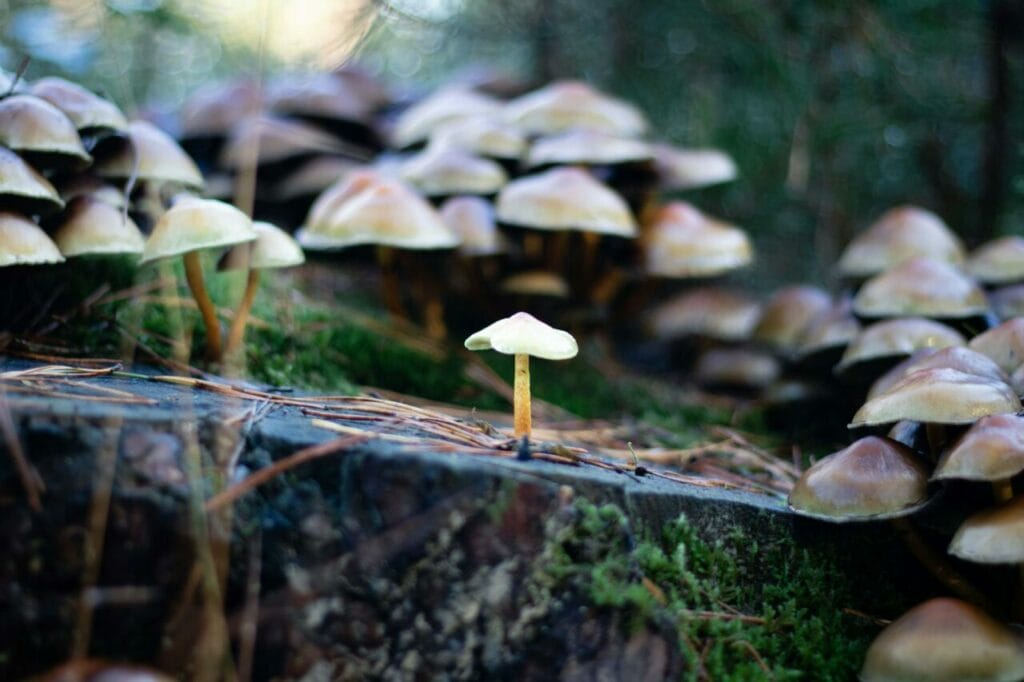Alzheimer’s Disease (AD), a severe neurodegenerative disorder, currently has no known cure. The increasing prevalence of this disease presents a substantial challenge. Researchers are investigating enhanced treatment approaches, exploring both natural and synthetic possibilities.
Various clinical trials have highlighted the potential benefits of serotonergic psychedelics such as LSD, DMT, and psilocybin in the treatment of Alzheimer’s disease. For more fascinating insights, feel free to explore online resources or contemplate “purchasing psychedelics online in Canada.”
[toc]
Psychedelics’ Function in Alzheimer’s Treatment
Conventional psychedelics may be effective in treating early-stage Alzheimer’s Disease (AD) or mild cognitive impairment (MCI) by stimulating brain cell growth.
Psychedelics may foster neural plasticity for learning and memory by influencing certain brain receptors, potentially slowing or even reversing the neurodegenerative effects of AD. Furthermore, psychedelics could help alleviate depression and anxiety, which are commonly observed in AD patients, by inducing positive psychological impacts.
There are still questions about how psychedelic treatments work. Some people suggest that vital psychological benefits come from experiencing profound effects from high-dose psychedelics, such as mystical sensations or a feeling of self-dissolution. Others argue that the key lies in the biological changes triggered by these substances. Both viewpoints may have some merit.
Conventional psychedelics appear to help the brain adapt and reduce inflammation, even at lower doses. Therefore, low-dose treatments could potentially benefit conditions like brain degeneration or migraines without causing significant mind-altering effects. However, for conditions like depression, anxiety, or addiction, the mind-altering effects seem essential, leading to introspection and behavior changes. Consequently, both low and high doses should be explored for personalized therapy.
Impacts of Serotonergic Psychedelics
Various serotonergic psychedelics, including LSD (lysergic acid diethylamide), DMT (dimethyltryptamine), and psilocybin (found in magic mushrooms), are generating considerable interest.
The potential therapeutic benefits of psychedelics on various mental health disorders have been garnering increasing attention.
Experts in the field propose that serotonin receptors, lauded for their cognition-enhancing abilities and role in modulating neuroplasticity, represent a promising target for research into Alzheimer’s Disease (AD).
The primary pharmacological effects of these substances are created by modifying the brain’s serotonin system, leading to alterations in perception, mood, and consciousness. The following points summarize the findings of numerous studies that support this theory:
- In particular, the 5-HT2A subtype of the receptors influences the gene expression of neuroplasticity-boosting neurotrophins in brain areas impacted by AD.
- These receptors control cortical signalling, a key factor for cognition, memory, and synaptic plasticity.
- Despite their uncommon distribution within neurons, serotonin receptors play a part in neural development, regeneration, and plasticity.
Significant Research Findings
- Serotonergic psychedelics have shown potential in alleviating aspects of AD pathology by promoting neuroplasticity.
- Classic psychedelics affect neurotransmission, stimulate synaptic remodeling, and elevate factors that foster neuronal survival.
- Specific psychedelics, such as muscimol and Sig-1R agonists, may reduce the neurotoxicity associated with AD progression.
- Classic psychedelics activate pathways in brain regions affected by AD, implying potential for slowing or reversing brain degeneration.
- Psilocybin mushrooms spur neural plasticity, stimulate neurogenesis, and induce lasting changes in brain circuits.
- By targeting receptor genes and driving changes in neurons and networks, psychedelics enhance brain connectivity.
Clinical research shows that both classic and non-classic psychedelics derived from magic mushrooms influence a range of biological processes in the brain. These include rapid changes in gene expression and substantial transformations in brain structure and function.
These psychedelics interact with receptors such as serotonin, sigma, NMDA, and GABA, resulting in improved synaptic plasticity and brain rejuvenation. Consequently, psychedelics might potentially exert positive effects on behaviour, memory, and cognition, positioning them as promising candidates for the treatment of AD and related disorders.
Order Psychedelics Online in Canada
Welcome to our online repository where we offer a wide selection of psychedelic products in British Columbia, Canada. If you’re considering microdosing magic mushrooms, we suggest beginning your journey with a reliable medicinal mushroom dispensary.
- LSD
LSD, a man-made drug, is derived from a fungus called ergot that grows on rye grains. This psychoactive compound has the ability to alter perceptions, emotions, and thoughts, even in small doses.
Excessive consumption of LSD can lead to severe hallucinations, warping your perception of time and space. Proceed with caution as substances touted as LSD could be other drugs such as NBOMe or substances from the 2C drug family.
| Product | Kittease – Ketamine Microdose Troche (30x50mg) | Zenly – LSD Gel Tabs – 600ug (100ug Per Tab) | Zenly – LSD Gummies – Sour Zen Berry – 200ug (100ug Per Gummy) |
| Intended Use | Stress, depression, pain management, PTSD, OCD, work-induced stress, performance anxiety, insomnia, and addiction. | Remarkable experiences | Remarkable experiences |
| Dosage | 50mg per troche / 30 per pack – 1.5 grams of ketamine/ per pack | 600ug total/6 Tabs (100ug/Tab) | 200ug total/2 Gummies (100ug/Gummy) |
| Usage Guidelines | Consume one full troche | Take one full tab to feel the full effect. Wait at least 2 hours before consuming another. | Consume one full gummy to feel the full effect. Wait at least 2 hours before consuming another. |
| Benefits | Rapid action with minimal risk, enhanced receptivity, ideal for self-reflection and cognitive enhancement. | Precisely measured dose for the perfect trip, lab-verified | Precisely measured dose for the perfect trip, lab-verified |
- Magic Mushrooms
Over 180 species of mushrooms are known to contain the substances psilocybin and psilocin, which are recognized for their therapeutic benefits and positive effects.
on mental health.The impact can vary depending on the type of mushroom, the particular cultivation batch, the amount consumed, and individual tolerance levels. Some people opt for microdosing to achieve subtle effects, while others consume larger quantities for a more intense experience. The quality can also differ based on the cultivation techniques used.
Blue Meanies, scientifically identified as Panaeolus cyanescens, are small dried fungi that flourish in warm tropical climates, usually on cow and water buffalo dung. As they grow, they develop blue spots on their surface, giving them their distinctive name.
- These fungi contain high concentrations of psilocybin and psilocin.
- They are historically used for recreational purposes, especially among the Balinese, who consume them during celebrations and for artistic inspiration.
- They are popular among tourists and travelers in places like Bali due to their hallucinogenic properties. These effects can include feelings of joy, hallucinations, euphoria, and intense laughter.
- DMT
DMT, a potent hallucinogenic substance, is present in certain plants like Psychotria viridis and Chacruna. Often called the “spirit molecule,” these controlled substances can trigger deep psychedelic experiences. They offer a brief, but intensely immersive journey characterized by vivid visual and auditory hallucinations.
| Product | Dream Machine – Vape Cartridge – DMT 1ml | Integral Alchemist – ACACIA Changa Pre-Roll | Integral Alchemist – Mimosa- 1ml DMT Vape Cart |
| Description | Explore hyperdimensional realms with DMT. | Experience ayahuasca-like effects with this blend of herbs and DMT. | Embark on a journey of mystical visions and spiritual insights with DMT. |
| DMT Content | 1g | Approximately 90mg | 1ml |
| Instructions | Preheat the cartridge and inhale gently. | Use the pre-roll according to your comfort level. | Experience immediate effects by inhaling the vapor. |
| Effects | Intense hallucinations, change in consciousness. | Visual psychedelic adventure, long-lasting. | Spiritual awakening, euphoria, profound changes in viewpoint. |
| Duration | Varies by individual | Up to 1 hour | Up to 30 minutes |
Long-Term Implications of Psychedelic Use
Contemporary research seeks to comprehend the lasting effects of psychoactive substances. “Long-term effects” typically refer to any persistent changes in cognition, emotion, or memory resulting from extended psychedelic use, though our understanding of these phenomena is still expanding.
The study of long-term psychedelic effects is complex. Some research suggests potential mental health benefits, while others point to possible risks such as inducing psychotic episodes.
Despite this complexity, scientists persistently work to understand the impact of prolonged psychedelic use on mental health. Rigorous research is conducted, with studies monitoring individuals over long periods to gather more accurate information.
Purchase Cannabis from a Trusted Supplier
Research suggests a pivotal change in Alzheimer’s disease treatment, indicating that psychedelics could dramatically alter our approach to brain disorders. Health professionals speculate that the therapeutic utilization of these substances could fully transform Alzheimer’s treatment, providing new hope for numerous patients and their families.
For high-quality offerings, opt for a trusted supplier like Magic Mushrooms Hamilton Canada. With a wide range of cannabis products available, such as flowers, edibles, concentrates, and more, Magic Mushrooms Hamilton Canada assures genuine, lab-verified products that meet rigorous food and drug regulations.
Place your order for shrooms online now.
Frequently Asked Questions
What distinguishes psychedelics from other substances typically used in Alzheimer’s treatment?
Psychedelics differentiate themselves from traditional Alzheimer’s medications through their therapeutic approach and impacts. They promote mental health by stimulating new neural connections, targeting the brain’s serotonin system, and providing profound psychological experiences.
Unlike conventional drugs that primarily manage symptoms, psychedelics are being assessed by Health Canada for their long-term benefits and holistic treatment approach, which includes therapy.
Research into the use
The potential of psilocybin to treat conditions such as obsessive-compulsive disorder, coupled with its ability to avoid multi-system organ failure, distinctively separates it from conventional controlled substances.
Can psychedelic-assisted therapy be considered as a viable treatment for Alzheimer’s patients dealing with end-of-life distress?
Psychedelic-assisted therapy could prove to be a beneficial treatment for Alzheimer’s patients who are critically ill and facing the inevitability of their life’s end.
- It provides emotional relief. This therapy has been observed to mitigate feelings of anxiety and depression in certain individuals, especially those in critical health conditions. This could be potentially beneficial for Alzheimer’s patients as well.
- Generally safe under supervision. Psychedelics, when used in a controlled environment under the careful guidance of a professional therapist, are usually harmless and accepted well by most individuals.
- Potentially enhances quality of life. In the case of an Alzheimer’s patient, emotional upliftment could bring about a significant positive change, even if their memory-related issues remain unaffected.
- More research is needed. Despite the promising outlook of this therapy, it is imperative to undertake more studies to ascertain its safety and effectiveness for Alzheimer’s patients, especially those in the terminal phases of their lives.
What is the length of a psychedelic therapy session for Alzheimer’s patients?
- Preparation Phase. This stage includes one or two sessions, each spanning 1 to 2 hours. The aim of these sessions is to prepare the patient for the forthcoming experience, establish expectations, and build trust with the therapist.
- Main Psychedelic Session. This crucial session, during which the patient consumes the psychedelic substance, typically lasts between 4 to 6 hours. The patient spends this period in a controlled environment, usually lying down with eye shades on and listening to music, while therapists provide close supervision.
- Integration Phase. After the main session, follow-up meetings are held to help the patient interpret and incorporate their experience. These sessions are usually 1 to 2 hours long each, with the number of sessions depending on the individual’s needs.
You might also want to check out:





